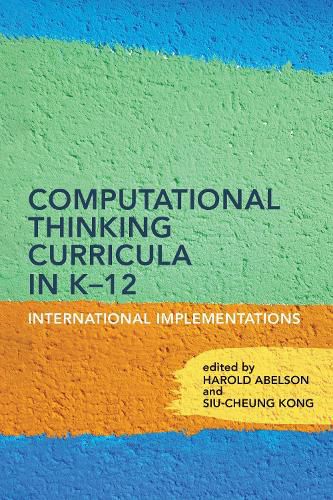Readings Newsletter
Become a Readings Member to make your shopping experience even easier.
Sign in or sign up for free!
You’re not far away from qualifying for FREE standard shipping within Australia
You’ve qualified for FREE standard shipping within Australia
The cart is loading…






An international overview of how policy makers, curriculum developers, and school practitioners can integrate computational thinking into K-12 curricula.
An international overview of how policy makers, curriculum developers, and school practitioners can integrate computational thinking into K-12 curricula.
In today's digital society, computational thinking (CT) is a critical component of all children's education. In Computational Thinking Curricula in K-12, editors Harold Abelson and Siu-Cheung Kong present a range of professional perspectives on the most effective ways to integrate CT into school curricula. Their edited volume, which offers an overview of educational policy, curriculum development, school implementation, and classroom practice, will appeal especially to policy makers, curriculum developers, school practitioners, and educational researchers. The essays cover twelve countries and regions across three continents- Australia, China, Finland, Hong Kong, India, Israel, New Zealand, Singapore, South Korea, Spain, Taiwan, and the United Kingdom, with a particular emphasis on Asia.
A companion to the editors' earlier Computational Thinking Education in K-12, this book consists of two sections- 1) educational policy and curriculum development and 2) school implementation and classroom practice. The authors delve into issues of regional history; governmental planning; official initiatives; leadership commitment; curriculum design; pedagogical implementation; equity, diversity, and inclusion; assessment, including longitudinal assessment across age groups; formal and informal learning approaches to CT; and teacher development. Specific topics include core competencies and CT education, robotics education and CT, AI and CT, and game-based platforms for computational problem-solving. The varying ways that CT is being integrated into the early grades, in particular, presents an interesting case study in international comparative education.
$9.00 standard shipping within Australia
FREE standard shipping within Australia for orders over $100.00
Express & International shipping calculated at checkout
Stock availability can be subject to change without notice. We recommend calling the shop or contacting our online team to check availability of low stock items. Please see our Shopping Online page for more details.
An international overview of how policy makers, curriculum developers, and school practitioners can integrate computational thinking into K-12 curricula.
An international overview of how policy makers, curriculum developers, and school practitioners can integrate computational thinking into K-12 curricula.
In today's digital society, computational thinking (CT) is a critical component of all children's education. In Computational Thinking Curricula in K-12, editors Harold Abelson and Siu-Cheung Kong present a range of professional perspectives on the most effective ways to integrate CT into school curricula. Their edited volume, which offers an overview of educational policy, curriculum development, school implementation, and classroom practice, will appeal especially to policy makers, curriculum developers, school practitioners, and educational researchers. The essays cover twelve countries and regions across three continents- Australia, China, Finland, Hong Kong, India, Israel, New Zealand, Singapore, South Korea, Spain, Taiwan, and the United Kingdom, with a particular emphasis on Asia.
A companion to the editors' earlier Computational Thinking Education in K-12, this book consists of two sections- 1) educational policy and curriculum development and 2) school implementation and classroom practice. The authors delve into issues of regional history; governmental planning; official initiatives; leadership commitment; curriculum design; pedagogical implementation; equity, diversity, and inclusion; assessment, including longitudinal assessment across age groups; formal and informal learning approaches to CT; and teacher development. Specific topics include core competencies and CT education, robotics education and CT, AI and CT, and game-based platforms for computational problem-solving. The varying ways that CT is being integrated into the early grades, in particular, presents an interesting case study in international comparative education.